Christopher Marlowe, Playwright and Spy
Christopher Marlowe, known to most as Kit, was born in Canterbury in early 1564. His father was a shoemaker, but young Kit’s intelligence was evident enough at an early age that his father sought a scholarship for him at the King’s School in the city. [1] The school was nominally a charitable institution that took “fifty boys both destitute of the help of friends and endowed with minds apt for learning”. In truth getting a place depended more on local influence than academic merit, and a working class child like Marlowe would only get a place if there were not enough sons of the Canterbury gentry to fill all fifty places. In fact, for the first few years he attended the school it was as one of the ten additional fee-paying students, with the fees probably paid by Sir Roger Manwood. In 1578 Marlowe managed to get a place as one of the scholars, which allowed him to complete his course at the school and move on to the next stage of his education – university.
Marlowe won his second scholarship to Corpus Christi College in Cambridge through his mastery of Latin and his talent at poetry. This talent was further honed through his scholastic endeavours, as in his spare time he translated the works of the Roman poets Ovid and Lucan into English rhyme. Both of these classical writers would show clear influence on his later work – the stark bleakness of Lucan’s Pharsalia contrasting with the elegance and passion of Ovid. Around his time at college is when he began his own writing – poetry and plays, some now lost. His first known play, Dido, Queen of Carthage, [3] was definitely written around this time. His prowess is all the more impressive given that while at college he almost certainly had some rather unorthodox extra-curricular activities – spying for the Crown.
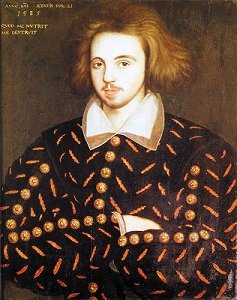
At the time England was in a hugely vulnerable position, internationally. A Protestant nation isolated from mostly Catholic Europe, with a female monarch that had no direct heirs or relatives meant that the country seemed easy pickings to some. Spain were an especial threat, buoyed by wealth coming in from South America, and smarting from losing out on getting a son of the Spanish royal family on the throne through their marriage to the previous Queen, Mary Tudor. It was no secret they planned to invade, and they followed through on that threat in 1588 (the year after Marlowe graduated Cambridge). That invasion was foiled, helped in part by the diligent work done by Elizabeth’s agents in the Spanish court in the years prior to this. Elizabeth’s spymaster was Francis Walsingham, outwardly a diplomat and advisor to the queen. In truth he was her hidden blade against threats both internal and external, most famous for his role in securing the legal execution of Mary Queen of Scots in 1584. For foreign operations, Walsingham generally used Englishmen rather than natives, having them pose as Catholic exiles if need be. His preferred recruiting ground was among the the impoverished lower class undergraduates at the great universities of Oxford and Cambridge, finding there the mix of intelligence and aspirationalism he needed. Marlowe would have been his ideal candidate.
While there is (of course) no direct evidence that Marlowe spied for Walsingham during his university years, there is indirect evidence – he took many unexplained leaves of absence from the university (shown clearly in the records), and his spending while at university showed resources much greater than his status as a poor student on a scholarship would allow. The greatest evidence comes from a scandal that almost prevented his graduation, when the university authorities heard rumours that he had gone to the English College in Douai (a school established on the continent for the education of English Catholic exiles by Philip II of Spain, and staffed by Catholic scholars who had fled Oxford and Cambridge). Of course, the English College was also a hotbed of conspiracy against Elizabeth. The rumour that the university governors heard was that Marlowe had been planning to convert to Catholicism and take a position at the English College. They only relented and awarded him his degree in 1587 when they received a letter from the Privy Council (of which Walsingham was a member) commending Marlowe as having performed some unspecified “good service” for the Crown.
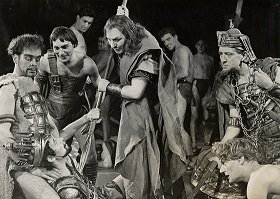
With his academic qualifications secured, Marlowe made his way to London. He had written a play called Tamburlaine the Great during his college years, and in 1587 it went on stage. At first the public didn’t really know what to make of it – with the exception of The Spanish Tragedy by Thomas Kyd (which came out around the same time) no drama like this had ever been performed in England before. The explosion in similar types of plays over the next few decades, however, shows that Marlowe had been smart enough to spot a major gap in the market, and skilful enough to fill it. Not for nothing is it said that without Marlowe we wouldn’t have Shakespeare. [4]
The exact ordering of his later plays is unclear, as there was no copyright protection at the time and so authors were reluctant to publish their plays. It’s pretty definite that some plays by Marlowe have been lost, due to this. For example, a play mentioned in the records called The True History of George Scanderbeg [5] is sometimes attributed to Marlowe (though there is no evidence of this). On the other hand, some of the plays we have that we do attribute to Marlowe are assigned based on analysis of the style, as no firm author exists. In total there are six plays commonly attributed to Marlowe, including Dido and Tamburlaine.
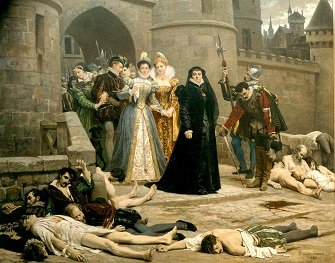
Two of these deal with European intrigue – The Jew of Malta, and The Massacre at Paris. The first is about the attempts of the Ottoman empire to take control of Malta a few decades before. The title character is Barabas, a rich merchant who has his wealth seized by the governor of the island to pay off the Ottomans. In revenge he undermines the government of the island and engineers its conquest by the Ottomans, before betraying them in turn. The play is notable for having a prologue which espouses contempt for all religion (referencing Marlowe’s own dangerous atheism), and for its influence on Shakespeare’s Merchant of Venice. On the other hand The Massacre at Paris, a portrayal of the massacre of the Huguenot Protestants in Paris on St Bartholomew’s Day 1572, held to the establishment line of Catholic treachery. It is nowadays most remembered for featuring the character of an “English Agent”, who may well (given the timeframe) be based on Marlowe’s mentor, Walsingham.
Another play which alluded to a potentially dangerous side of Marlowe’s life was Edward the Second, which told of that King being dethroned and murdered by his wife Isabella of France. Some biographers believe that Marlowe was drawn to this story by Edward’s relationship with his “favourites”, Piers Gaveston and Roger Mortimer. Whether Marlowe was himself homosexual or not (a topic hotly debated with little evidence on either side), he had included several intimations of homosexual relationships in some of his earlier plays. Still, the relatively frank depiction of homosexual relationships (of a King, no less) is not what one thinks of when on thinks of Elizabethan plays. Some argue that the gruesome death Edward II suffers at the end of the play is the only way Marlowe could make this acceptable to the critics.

The most famous of Marlowe’s plays, of course, is Doctor Faustus. This was based on the folk tales that even then were beginning to spring up around the notorious German alchemist and charlatan Johann Georg Faust. In 1587 a book of these stories had been translated from German to English and published in London. This book, Historia von D. Johann Fausten (by an anonymous author) codified the legend of Faust by inserting him into the well worn template of “diabolic pact” stories, and would go on to be the basis of a novel by Goethe, several operas, and of course Marlowe’s play. For the most part Marlowe’s play follows the book. Faust is a bored scholar who makes a deal with the Devil (through his representative, a demon named Mephistopheles) to exchange his soul for magical power. However the deal comes with a time limit, and at the end Faust is either born off bodily to Hell, or killed by devils who claim his soul. [6] The former was Marlowe’s original ending, while the latter was added (as an offscreen event) in a subsequent rewrite. The play was both hugely controversial, and hugely popular. The special effects left some who attended the early performances convinced that actual demons had appeared on stage. While this led to some calls for Marlowe to be investigated for witchcraft, it also led to a huge increase in audiences for later showings. The later controversy was more theological in nature, and revolved around whether Faust’s “deal with the devil” was a criticism of the Calvinist doctrine preaching the predestination of the soul. It’s likely that this side of the whole thing never even occurred to Marlowe, though. His own heresies were far more direct in nature.
The growth in freedom of belief about theological matters that the Anglican church permitted led some down paths that were dangerous, even in this atmosphere. Atheism was a crime on a par with any non-Anglican belief, but there were many intellectuals who found themselves drawn to the idea. Sir Walter Raleigh is the most famous of the secret atheists that modern historians dub the “School of Night”, [7] but Marlowe runs him a close second. Of course, there’s always the chance that this, like his apparent flirtation with Catholicism, was part of some pose to infiltrate enemies of the Crown. The exact details of his ongoing espionage career are of course, still vague and contradictory. There’s a reference to a “Morley” who was a tutor in the court of Scotland and who may have been Marlowe spying. Marlowe was definitely arrested in 1592 for counterfeiting, two years after Walsingham’s death from a long running illness. This carried a death penalty, but he was released without charge. It may be that the counterfeit coins were to be supplied to Catholic rebels to provide a pretext for eliminating them. As such, it seems a possibility (if not certainty) that he was still working for the Crown at this point. This casts an interesting light on the fateful events of 1593.
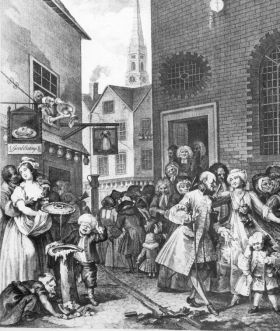
At the time, there was some unrest in London over the influx of refugees to the city. These refugees were Dutch Protestants, fleeing persecution to England which (as a a Protestant country) promised them sanctuary. In May 1593 handbills appeared in London threatening violence against the refugees and accusing them of having used religious persecution as a pretext for migrating on economic grounds. [8] The text of the handbill was in iambic pentameter, the meter of playwrights, and contained several references to events from Marlowe’s plays:
Since words nor threates nor any other thinge
canne make you to avoyd this certaine ill
Weele cutte your throtes, in your temples praying
Not paris massacre so much blood did spill.
The bill was signed “Tamberlaine”, another possible reference to one of Marlowe’s works. Complaints over the posted bills led to a concerted search for those responsible, and the authorities arrested Thomas Kyd, who like Marlowe had been a pioneer of the early theatre. Kyd was tortured (as was judicial procedure at the time), but he maintained his innocence. His rooms were searched, and atheistic books were discovered. Kyd maintained that these belonged to Marlowe, and had been mixed in with his papers accidentally. The courts believed him, and he was released (though his career and health both never recovered, and he died mired in debts the following year). An order was issued for Marlowe’s arrest, and he voluntarily turned himself in on the 20th May. However the Privy Council were not in session, and he was released on his own recognisance to return when they were. It was an oath that, through no fault of his own, he would not keep.
On the fateful night of the 30th May, Marlowe was staying in a boarding house in Deptford ran by a widow named Eleanor Bull. Records suggest that this was, in the parlance of the spy trade, a “safe house” where agents could lay low and evade notice. This might suggest that Marlowe was planning to flee the country, and the three people that he met there that night would reinforce that notion. They were Robert Poley (a diplomatic courier), Ingram Frizer (an agent of Thomas Walsingham, the brother and right hand man of the late Francis), and Nikolas Skeres (a con man and associate of Frizer). Quite what Marlowe hoped to gain from the meeting, and what the four men discussed, is something we will probably never know. The official coroner’s inquest said that Frizer and Marlowe argued over the bill. When the argument grew heated Marlowe drew Frizer’s knife and attacked him with it. Frizer struggled with him in self defense, and as a result Marlowe was fatally stabbed in the eye. Of course, this all smacks more than a little of a coverup. The most commonly accepted theory nowadays is simply that Marlowe knew too much, and so rather than expedite his escape from arrest Thomas Walsingham instead ordered his death. The blow to the eye was a common killing blow for skilled knife fighters at the time, and Frizer was just such a fighter. The coroner, of course, would say whatever the authorities told him to.
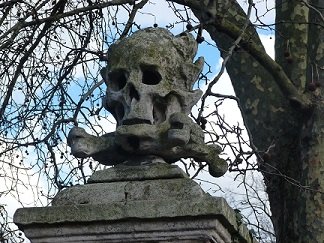
William Shakespeare, who definitely knew Marlowe by reputation if not personally, later memorialised his death in his play As You Like It. In the play he has one character quote from Marlowe’s poem Hero and Leander:
Dead Shepherd, now I find thy saw of might, ‘Who ever loved that loved not at first sight?’
While later in the same play, he directly, though subtly, references Marlowe’s death:
When a man’s verses cannot be understood, nor a man’s good wit seconded with the forward child, understanding, it strikes a man more dead than a great reckoning in a little room.
The line is reminiscent of some of Marlowe’s own phrasing, while the “great reckoning” is a reference to the bill (or “reckoning”) that was the pretext for his death. It was a subtle tribute, typical of Shakespeare’s own love of layering multiple levels of meaning within his plays and fitting for the playwright who was so clearly the greatest influence on his work. He was not the only one to speak fondly of the late Marlowe, however – poets and dramatists throughout London generally mourned the passing of one they regarded as one of the best among them. Even now, with such a small body of work, he remains the most famous of the Elizabethan playwrights after Shakespeare. Perhaps one day we’ll learn the true nature of the “great reckoning in a small room” that brought his career to an end.
Images via wikimedia except where noted.
[1] Founded in 597AD, still operating today and generally considered the oldest continuously operating school in the world. It had been a monastic school until Henry VIII dissolved the monasteries. He kept the school open, but now under his royal charter. Though by the time Kit attended it England now had a queen, the new title remained.
[2] An MP and barrister who was at the time Chief Baron of the Exchequer – essentially a high court judge who was the ultimate authority on debt-related rulings. He was a huge proponent of free education, and founded a grammar school in Kent as well as sponsoring promising young scholars like Marlowe.
[3] Based on the Aeneid, another classical Latin work.
[4] In fact, Marlowe is one of the most common cited “real authors of the works of Shakespeare”. This somewhat odd but popular vein of fringe scholarship seems to be based on an oddly Victorian sense of snobbishness. The idea that a grammar-school kid from Birmingham could have been the author of the greatest works of English literature is so abhorrent to some people’s perception of class and talent that even Marlowe (who came from a similar background but at least had a university education) is preferable.
[5] About a legendary ruler of Albania who held back the Ottoman Empire from invading Europe in the 15th century.
[6] Well, except in Goethe’s version where he’s redeemed by the power of “true love”.
[7] Based on an irrelevant Shakespeare quote where someone is insulting a woman’s hair. The evocative phrase has all by itself sparked myriad conspiracy theories, though.
[8] Plus ca change.
[9] This being the main justification (along with Shakespeare only rising to prominence after Marlowe’s death) given by those who believe that Marlowe faked his own death to avoid arrest, and then “went into hiding” as the most famous playwright in world history.
